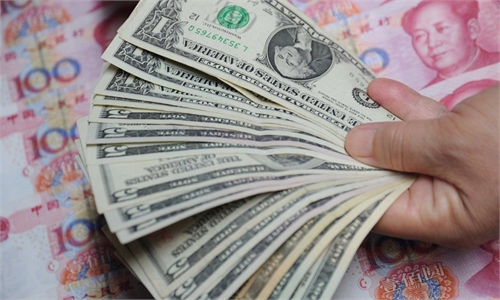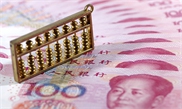Chinese exporters voice mixed feelings over yuan fluctuations, but depreciation ‘won’t continue’
Foreign capital betting on long-term investment opportunities in Chinese assets

A view of a port in Shenzhen, South China's Guangdong Province Photo: VCG
Chinese exporters expressed mixed feelings about the impact of the yuan's depreciation against the greenback, with the most calling for a stable currency to benefit long-term trade. Experts said that the steady rebound of the Chinese economy and mature industrial and supply chains will mean the currency's exchange rate will stabilize at a reasonable level, and that yuan based assets will remain attractive to foreign investors.After the onshore Chinese yuan spot exchange rate against the dollar slid to 6.92 and the offshore rate breached 6.93 on Monday, the lowest in two years, the currency regained some ground to stand at 6.89 and 6.90 respectively as of 3:30pm Wednesday.
On the same day, the central parity rate of the Chinese yuan weakened 104 basis points (bp) to 6.8906 against the US dollar, according to the China Foreign Exchange Trade System. In August, the currency's central parity rate depreciated1,469 bp against the dollar.
Chinese exporters expressed mixed feelings over the currency fluctuations, with some saying a temporarily weakened yuan against the greenback would yield some foreign exchange earnings while some cross-border retailers saying the number of orders didn't increase as initially expected.
Zhejiang Feng Long Electric Co, a manufacturer of automobile parts, said that nearly 50 percent of the company's products were sold to export markets, most of which traded in dollars, and thus the yuan's depreciation would benefit the company's revenue in the short term. "However, we are aiming to achieve balance with our clients in the long-term, as win-win cooperation is a solid foundation for our long-term development," it stressed.
"Though the benefits of a weak yuan are apparent for traditional exporters, the positive impact on cross-border business-to-customer retailers is not significant," Zhu Qiucheng, CEO of Ningbo New Oriental Electric Industrial Development, told the Global Times on Wednesday.
The number of overseas orders has not increased, Zhu said, noting that the exchange rate fluctuation is relatively normal, and thus there will not be a large increase in orders over the short term.
It's worth noting that the Chinese yuan has displayed continued resilience and stability against non-US dollar currencies, with RMB Index - which measures the yuan's performance against a basket of currencies - still standing above 100. In contrast, the greenback surged to a 20-year high amid market expectations for higher interest rates in the US.
"If we settle in US dollars, small- and medium-sized enterprises like us generally will take into account the fluctuations of exchange rate and stipulate in the contract how to deal with the risk," Zhu said, noting that they tend to settle in yuan, for example in Southeast Asian region, to avoid risks of an unstable dollar.
With the release of policy dividends from Regional Comprehensive Economic Partnership (RCEP), the use of yuan settlement will become a mainstream, which is also a good option for foreign trade, he said.
Appeal to global investors
While a weak yuan against the greenback may yield some benefits to China's exports, it may also add pressure on capital flight. In this regard, experts said that China's sound economic fundamentals, its industrial upgrade and huge market potential mean that the long-term value of yuan assets will remain attractive to global investors.
Despite unstable and uncertain factors present throughout the external environment, China's foreign exchange market has the foundation and conditions to continue to operate smoothly, Wang Chunying, a spokesperson of the State Administration of Foreign Exchange (SAFE) said at a recent press briefing.
"China has continued to implement the efficient coordinated epidemic prevention and control as well as economic and social development. China's economy has continued to recover, with its long-term sound fundamentals unchanged," she said, noting that the country's foreign exchange market has become more resilient.
Meanwhile, the Chinese central bank has a range of tools at its disposal to stabilize the yuan's exchange rate, such as further cutting foreign exchange reserve requirements and introducing a countercyclical factor in setting the yuan's daily reference rate against the dollar, according to experts.
"Looking ahead, the yuan's exchange rate will unlikely weaken to 7 against dollar by the end of 2022," Zhou Maohua, a macroeconomic analyst at Everbright Bank, told the Global Times on Wednesday.
He said the steady domestic economic recovery, along with expectations for a weakening dollar amid slowing US economic growth and the EU's sizable interest rate hikes, will drive the yuan to bottom out in the second half of the year.
Voting for China's long-term development, foreign investors continue to increase their holdings of Chinese equities and bonds.
Between August 1 and August 16, a net total of $5.6 billion worth of foreign capital flowed into China's bond market, $300 million flowing to India while $1 billion foreign capital exited South Korea, domestic news outlet Yicai reported, citing Barclays analysts.
International investors still hope to participate in China's capital market and consider investment in the A-share market an important part of their asset allocation, Qian Yujun, chairman of UBS Securities, said at the company's forum on investment in the Chinese A-share market on Tuesday.
As a foreign financial institution with an extensive presence in China, UBS Securities will continue to provide convenient services for international investors to participate in Chinese market, Qian said.


